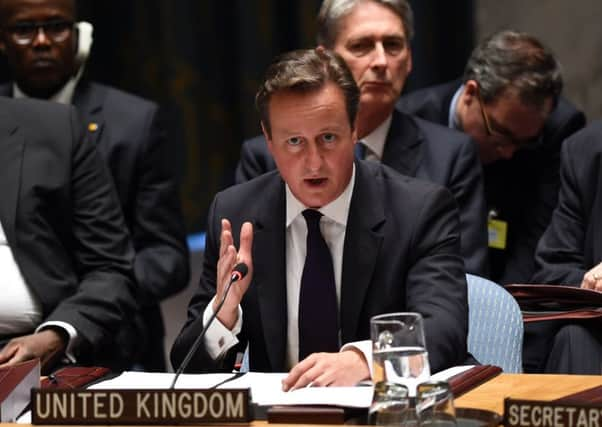Leaders: Mission is possible, but detail is critical


When British servicemen and women are being asked to risk their lives, there is no more important role for parliamentarians than to learn as much as possible what the armed forces are being asked to do. Equally the government needs to show it has a thoroughly thought-out and nuanced strategy.
The legality of the action seems beyond dispute. The government is responding to a request for military assistance by Iraq’s government. And by limiting the terms of the motion to be debated to action in Iraq, ruling out similar action in Syria, the scope of this proposed operation seems clearly defined.
Advertisement
Hide AdAdvertisement
Hide AdBut this definition does raise questions. If IS is beaten back into its base territory in Syria, freeing Iraq from its menace, do UK forces simply return home? Will there be some other military operation in Syria of which the UK will not be a part?
This seems to be implied by American air raids in Syria. Is there some arrangement which is keeping the Syrian government sitting on its hands? It should be recalled that president Assad’s abhorrent regime, unwanted by most Syrians, is allied to Iran whose ground forces are already in action against IS. If some broader international power game that may benefit president Assad is being played out here, we have a right to know about it before we participate.
Such questions are part of a much wider one – whether there is a long-term strategy for ridding the world of IS. The terms used by David Cameron and President Obama strongly suggest that its menace can only be removed by completely eliminating it.
That raises not just the issue of what will be happening in Syria and who will be participating. IS cannot be beaten by using air power alone. Ground forces will be required too. But whose boots are to be put on the ground? While there may be a temptation to commit US, UK and other western special forces, the unhappy record of western interventions suggests strongly that ground actions should be carried out only by forces from Muslim countries.
The questions do not end there. What about the detention of IS militants and those suspected of IS involvement? Under whose jurisdiction will prisoners be held and tried? IS may be barbaric and evil, but Britain must not stoop to those levels, or be complicit in others doing so.
Finally, how will we know when the mission is completed? Is there a timetable for getting out? Or do UK forces have to remain to secure the highly porous Syria-Iran frontier? And what would a successful outcome look like? MPs have a big job to do.
Disgraceful diplomacy
That any British citizen should be held in a foreign jail under sentence of death for blasphemy is utterly abhorrent. It is all the more repellent for the man, Mohammad Asghar, from Edinburgh, being 70 years old and having a recent history of mental illness, a condition apparently not taken into account at his so-called trial in Pakistan.
But it has now turned into a complete abomination with his shooting in the back by either a prison guard or police officer. Mr Asghar was seriously injured in the incident in which another prisoner is said to have been shot to death, but is reported to be in a stable condition in intensive care.
Advertisement
Hide AdAdvertisement
Hide AdNaturally, Mr Asghar’s family are extremely distressed, all the more so because they appear to have been assured by the Foreign Office that if they kept silent about the outrageous imprisonment and sentencing of Mr Asghar, he would be returned safely.
Now their anger has boiled over and their legal representative has accused the British government of failing to provide any meaningful assistance to Mr Asghar. While we do not know what negotiations have taken place, the family has grounds for believing that discussions behind closed doors between diplomats and officials are not enough, and for seeking the intervention of the prime minister at higher levels to secure Mr Asghar’s release.
David Cameron should do so, urgently. The entire process to which Mr Asghar has been subjected is an affront to any civilised standards, particularly so because of his mental illness.
What threat a frail 70 year-old man posed that required an officer to shoot him is incomprehensible. It reflects badly on Pakistan and surely offends Pakistanis everywhere.